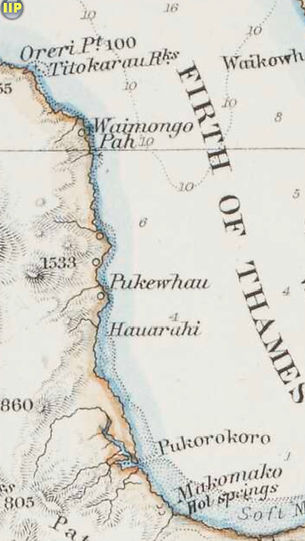
TE WHĀNAU-A-HAUNUI
History of Waimangō
Continuously 'Owned' by Māori since the 14th century - an unbroken continuum
Waimangō first came into the hands of our Tainui ancestors when they arrived from Hawaiki in approximately 1350. It was handed down to the Marutūahu family, and then to the Ngāti Whanaunga family. It then came into the hands of the various hapū of Ngāti Whanaunga particularly Ngāti Puku and Ngāti Rangiaohia. After a period of time, it came into the hands of Eruera Maihi, Tukumana Te Taniwha and Te Paenga Reihana, of Ngāti Whanaunga. Finally, Tukumana’s whāngai-foster children Haunui Tukumana Royal and Ira Tukumana Renata inherited Waimangō from Tukumana and his brother Pae.
History of the Waimangō Block - Wharekawa 4B2A1B2
Waimangō is part of a much larger block of land called Wharekawa No.4. This block stretched from Tāpapakanga in the north to the Pūwhenua stream, just south of Waihīhī (Waharau). This block formed the bulk of the Ngāti Whanaunga lands on the western side of the Firth.
The larger Wharekawa No.4 block was adjudicated by the then Native Land Court in the 1860s and title was first established on the 30th of April 1869.

An extract from a map by Hochstetter.
The original owners included both of Tukumana's parents - Reihana Poto, his father, and Karukino Te Taniwha, his mother. Other owners included Hori Ngākapa Te Whanaunga, (uncle of Tukumana Te Taniwha being his mother's brother) the leading Ngāti Whanaunga rangatira of his time. The list also includes Hemi Te Ahipū, the tupuna of Uncle Pip Solomon (Tiraputuputu Te Ahipū), one of our grandfather's great friends and whanaunga. The list also includes Kītahi Te Taniwha and Renata Kītahi, uncle and cousin respectively of Tukumana and tupuna of the Renata whānau of Te Kouma/Manaia on the Coromandel Peninsula. (See link below for full list.)
Over the years, the Wharekawa No. 4 block was steadily subdivided amongst the various families of Ngāti Whanaunga leading to the alienation of most of the block by the mid-1950s. This process, initiated by the individualisation of title through the Native Land Court, occurred throughout Aotearoa-New Zealand and lead to the widespread and massive alienation of iwi land. Given this history, it is remarkable that Waimangō remains in Māori ownership, the last remaining piece of Wharekawa No. 4 land of significant size.
Attached here is a report by historian David Alexander showing the passage of ownership from the time of Wharekawa No. 4 till the time in which the Waimangō property came into our grandfather's hands in the 1950s.
Historical timeline for Wharekawa 4B2A1B2
Haunui Tukumana Royal and Ira Tukumana Renata inherit Waimangō
Tukumana passed away in 1941 and was buried in the family urupā at Waimangō. His interests in Waimangō were then passed to his whāngai-foster children, Haunui and Ira. This was done in accordance with his will, a copy of which can be read here:
Copy of the will of Tukumana Te Taniwha of Ngāti Whanaunga.
The passing of Waimangō to Haunui and Ira was also done in accordance with tikanga Māori (Māori custom) pertaining to the status of whāngai children. In 1948, the Auckland Museum ethnologist, George Graham (who was well known to Tukumana), published an article describing the difference between an atawhai child and a whāngai child. In the case of the former, a child is cared for by a non-biological parent but the child does not possess rights in the property and estate of the parent. In the case of the whāngai, however, this child does inherit all rights to the property and estate of the parent as if he/she is a biological child.
Whangai Tamariki by George Graham
It is important to note that in his will, Tukumana refers to both Haunui and Ira as "aku tamariki whāngai", "my foster children". Please also note that Ira Mutu Kārewa referred to in Tukumana's will is Ira Tukumana. Ira, or Aunty Ada as she was known, was married first to Mutu Kārewa of Ōmahu before she married Tommy Renata of Manaia. She then became known as Ira Renata or Ada Renata.
Te Paenga Reihana
Haunui and Ira succeeded to Tukumana's interests in 1941. At that time, Tukumana's younger brother Te Paenga Reihana also had interests in Waimangō. Hence, in 1956, Haunui and Pae went to the Land Court to arrange to separate out their particular interests. This was agreed to and the result was that land to the south of the Waimangō stream (approx 45 acres) was vested in Pae. Haunui also agreed to pay Pae an amount of 1700 pounds. Hence, the land to the south of the stream became Pae's only and the land to the north of the stream (the Waimangō property today) came into the possession of Haunui and his foster-sister Ira.
Extract from minute book of Māori Land Court, Auckland Minute Book 20, 106-108, 1956